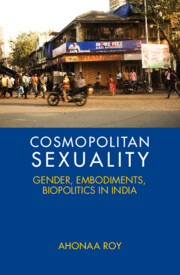Book contents
- Frontmatter
- Dedication
- Contents
- List of Figures
- List of Abbreviations
- Acknowledgements
- 1 Introduction
- 2 Bioengineering, Beauty and Racial Sensibility
- 3 Contesting Violence, Constructing Power
- 4 Festival, Spectacle, Eroticism
- 5 Biopolitics and Biosocial Citizenship
- 6 Performative Participation, Sexual Health and Community Development
- 7 Cosmopolitanism: Rights, Citizenry and the Culture of Representation
- 8 Postscript
- Glossary
- Index
3 - Contesting Violence, Constructing Power
Published online by Cambridge University Press: 14 October 2022
- Frontmatter
- Dedication
- Contents
- List of Figures
- List of Abbreviations
- Acknowledgements
- 1 Introduction
- 2 Bioengineering, Beauty and Racial Sensibility
- 3 Contesting Violence, Constructing Power
- 4 Festival, Spectacle, Eroticism
- 5 Biopolitics and Biosocial Citizenship
- 6 Performative Participation, Sexual Health and Community Development
- 7 Cosmopolitanism: Rights, Citizenry and the Culture of Representation
- 8 Postscript
- Glossary
- Index
Summary
This chapter draws the trajectory of the contemporary conflict in the lives of the hijras in Bombay, exploring the ways in which hegemony, resistance and terror play out in the reality of organized social relations. With ethnographic storytelling, the stories of the characters – Leela, Geeta and Saleem Khan, and Nitu – reveal the social fabric of their everydayness, delineating a unique perspective of violence. A deep ethnography offers here a different and much-needed view of the power politics within the subculture that further responds to a form of political propaganda as an enactment of resistance in their experiences. Situating this context within the modern struggles of power, these powerful subjects impinge on the analytical framework of power and domination to impose discipline. And again, their disciplinary techniques are confined to the level of cultural manifestation of contemporary consumption, erotica and certain political expressions of resistance.
Anthropological scholarship on violence is largely linked to the study of the cultural implications of conflict (Whitehead 2004), and little attention has been given to the study of violence from the point of view of the nuances of the act of violence. The task of the anthropologist is to explore the interpersonal relationship of the performers, adding to the meaning of the interplay of power relations that builds on new experiences and also new anthropological denotations. David Riches in his book, The Anthropology of Violence (1986), attempts to underline the fact that the very act of violence bears a core political motive of establishing the hegemony of power. Riches’ purpose is to understand violence on a ‘tacit pre-empting’, to secure the assumption of micro-politics and the broader notion of the infliction or coercion of the perpetrator and the ways to defend against them (Riches 1986: 5). This raises the crucial issue of attempting to understand that power is intrinsic to social relationships and also unavoidable. Further, the act of power has no midway, but the weakening of the less powerful by those that hold more power. Riches provides a deeper understanding of violence, referring to it as an imagery construct or a scenic metaphor that he calls the ‘dynamic triangle of violence’.
- Type
- Chapter
- Information
- Cosmopolitan SexualityGender, Embodiments, Biopolitics in India, pp. 76 - 103Publisher: Cambridge University PressPrint publication year: 2023



